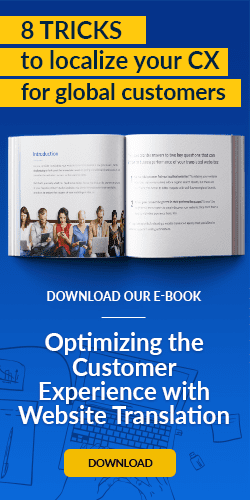Editor’s note: This is the final installment in a four-part series that provides companies with powerful insights and smart ways to engage online consumers in new markets during the holiday shopping season. Read part one here. Read part two here. Read part three here.
We’re highlighting holiday shopping in this post, but make sure to download the free accompanying Germany: Market Insights and Campaign Opportunities report via the sidebar below. This document reveals additional noteworthy holidays, and ways to best serve Germans online throughout 2017!
Germany presents a powerful growth opportunity for companies that are willing to localize their websites to serve Germans in their language of choice—especially during the Holiday shopping season.
With 82 million residents, Germany is Europe's most populous country, and it's ripe for online expansion, particularly by companies in other Western markets. Germany's Internet penetration rate is currently at 87%, and is growing by about 2% every year. (That means about 1.5 million new German customers are going online each year.)
Its e-commerce penetration rate-about 75%-is equally impressive. Germany ranks fifth in global e-commerce revenue, behind other economic powerhouses as the U.S., China, Japan and the UK. In fact, with Britain's recent "Brexit" from the European Union, Germany is now the EU's No. 1 e-commerce market.
Earlier this year, we identified Germany as the world’s No. 2 expansion-worthy market for e-commerce and other online endeavors in our MotionPoint Index™, and with good reason: when examining the quantity of e-retail sites serving Germans (particularly compared to those serving U.S. and UK customers), the market appears relatively untapped.
Like most markets, Germany's e-commerce revenues light up like a proverbial Christmas tree during the Holiday shopping season. But how can international companies best serve these online consumers? It takes more than mere website translation, It requires cultural knowledge and actionable marketing intelligence.
We aim to provide both in this post, and especially in the accompanying (and free) Germany: Market Insights and Campaign Opportunities report available via the sidebar. The document spotlights noteworthy German 2017 holidays and special days, and offers smart ways to serve Germans online in creative, authentic ways.
Download the free report via the sidebar.
Now, let’s take a look at how savvy companies and marketers can make the most of the Holiday 2016 shopping season in Germany.
Black Friday and Cyber Week
Some of America's greatest exports these days seem to be retail sales events. While Germans don't celebrate Thanksgiving the way U.S. residents do, they've certainly taken a shine to post-Thanksgiving Black Friday and Cyber Week sales events. Some of Germany's largest participating retailers include Amazon, and local retailers such as Otto and Zaland. Germans enjoy a good deal, so these sales events are gaining in local popularity. We've seen clients experience, on average, a 98% increase in German-site sales on Black Friday. This sales surge accounts for a nearly 25% average growth in revenue. E-commerce conversion rates are also through the roof on Black Friday-by over 70%. Companies that don't offer Black Friday discounts-and don't promote those sales on display, social and search advertisements-are practically leaving money on the table, we've found.
Same goes for Cyber Week deals. Our data reveals they generate compelling results on Germany e-commerce sites. The retailers we've worked with have seen nearly 55% increases in average revenue during the sales week. Our data also revealed a nearly 185% increase in revenue, when comparing sales Black Friday to after Cyber Monday.
Note, however, that Germans generally return items more often than other consumers. Return rates can be as high as 50%. We recommend investing particular effort in ensuring your localized online content and product descriptions are explicit and clearly manage expectations. This wildly reduces the chance of misunderstandings—and returns.
We've also seen that e-retailers that promote and sell multiple brands see greater sales success during Black Friday and Cyber Week. Branded retailers, which sell their own branded merchandise exclusively, sell less in comparison. Why? We believe it's because German customers gravitate toward shopping at familiar e-commerce sites, particularly during sales events. Branded retailers can still compete, however, by promoting these Holiday discounts well in advance, to capture consumer attention.
(You can uncover more insights about Black Friday, and other sales events in Germany, by downloading the Germany: Market Insights and Campaign Opportunities report via the sidebar.)
St. Nicholas Day
Germans commemorate the life of St. Nicholas on December 6, known locally as Nikolaustag. This event also signals when the traditional Holiday shopping season begins in Germany. Be sure to adjust local marketing and promotions accordingly-at least two days in advance, if not more. We've seen our clients' German e-commerce sites generate an average 80% increase in revenue on December 6 alone.
Christmas
Christmas is less commercialized in Germany than in the U.S., though it remains a very popular gift-giving holiday. Localized e-commerce sites are uniquely positioned to serve Germans in the days leading up to, and just after, Christmas.
Since local brick-and-mortar stores are often closed from December 23 to 27, German e-commerce sites can offer major online deals for consumers who need an “eleventh hour” gift—or who want to pick up something special for themselves at a deep discount.
New Year’s Eve
Like consumers in most markets, Germans celebrate New Year's Eve and New Year's Day with fireworks and parties. Online sales often sag during this time. Retailers can attempt to combat this slump with special deals, but should manage expectations. After all, Epiphany sales are right around the corner…
Epiphany
Like many Europeans, Germans celebrate the Christian holiday of Epiphany on January 6. For Germans, this often marks the formal end of the Holiday season. In many regions, post offices, banks and stores are closed for business … but consumers can still shop online.
Epiphany represents the last major increase in online sales during the German winter season. Smart retailers should consider it one last opportunity to promote special discounts or other appropriately-themed messaging. MotionPoint data from the past three years indicates that savvy retailers can see Epiphany conversion rates increase by an average of 153%. We've seen revenues also increase by 430%.
Wrapping Up
We hope these insights into serving German consumers online during Holiday 2016 have been helpful. However, there’s much more where that came from, in our Germany: Market Insights and Campaign Opportunities report.
Discover many more German holidays, and ways to engage German consumers online on those special days, by signing up for the free report via the sidebar above.
And be sure to contact us with further questions about serving Germany, or other global markets. We can help you identify ways to communicate effectively, and authentically, with new customers around the world.
Last updated on November 10, 2016
